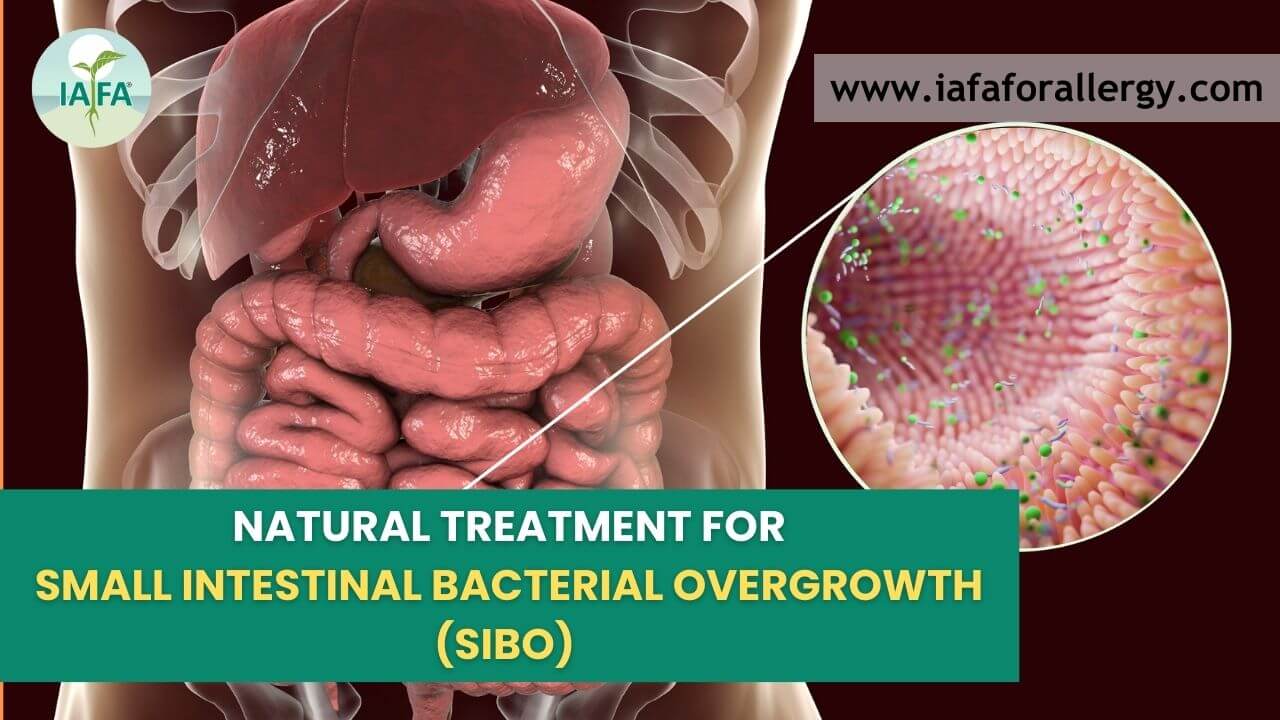Small Intestinal Bacterial Overgrowth, shortly known as SIBO is a gastric condition, occurs in the small intestines.
Everyone knows that our gut is home to trillions of bacteria, but do you know that most of these bacteria are present in the large intestine, not in the small intestine.
Because the food movement and gastric acids in the small intestine do not support the bacterial growth.
But patients with SIBO have the overgrowth of bacteria in their small intestines causing discomfort to the gut and can cause gastric and non-gastric symptoms such as bloating, vomiting and fatigue.
At IAFA®, Dr. Sahil Gupta (B.A.M.S., M.H.A.) has helped many patients reclaim gut health from SIBO. He diagnose the root cause why bacteria overgrow in the small intestine due to weak Agni, sluggish gut movement, and dosha imbalance. Then with personalized Ayurvedic care, he reduces overgrowth, restores gut balance, and treat SIBO.
In this article, Dr. Sahil has shared scientifically proven methods and natural ways to prevent the overgrowth of bacteria in the small intestine.
Symptoms of Small Intestinal Bacterial Overgrowth (SIBO)
- Abdominal bloating and feeling of fullness after eating
- Excessive gas release
- Abdominal pain or discomfort
- Weight loss
- Vomiting and indigestion
- Iron and B12 deficiency
- Fatigue
- Irregular bowel movements (Diarrhea or Constipation)
- Constipation based on the bacterial species (methane-releasing bacteria).
- Diarrhoea (hydrogen-producing bacteria)
How Ayurveda Views Small Intestinal Bacterial Overgrowth (SIBO)
Ayurveda always focuses on the root cause of the disease, SIBO Natural Treatment helps in the elimination of this root cause. In this, the main root cause of the disease can be an imbalance in the three doshas.
Imbalance in the Vata, Kapha, and Pitta doshas leads to the overgrowth of bacteria and lead to discomfort.
These doshas plays a key role in maintaining good gut health, for example –
- Pitta is responsible for Agni in the gut, leading to proper digestion and correct secretion of digestive juices.
- Vata is for controlling movement and elimination of the food.
- Kapha is known for its lubricative properties and governs the structure.
So, any slight imbalance in these doshas results into SIBO.
Causes of SIBO
According to Ayurveda, when your digestive fire, known as Mandagni, becomes weak, food you consume is not broken down properly. That unprocessed food ferments in the gut.
This poorly digested food produces Ama (toxins), which disturb the balance of doshas in the intestines and gradually weaken your immunity. Along with this, too much Kapha can add heaviness and mucus.
While Vata imbalance happens, it slows down gut movement. Food then sits in the small intestine for longer time, which gives bacteria a chance to grow. Vata imbalance happens often because irregular eating habits, stress, or ignoring natural urges like vomiting, urince and flatulence.
When you eat incompatible food combinations (Viruddha Ahara), such as milk with fish, that exacerbates the problem by upsetting digestion and disturbing gut bacteria.
When all these factors come together, your small intestine becomes the perfect place for bacterial overgrowth.

Tired of chronic bloating, fatigue, or gas with no relief?
At IAFA®, Dr. Sahil Gupta (B.A.M.S., M.H.A.) treats SIBO at its root naturally.
The naturally treatment clears bacterial overgrowth, strengthens digestion, and restores balance with safe, Ayurvedic therapies.
Book your consultation today and start your journey towards gut health.
– Dr. Sahil Gupta (B.A.M.S., M.H.A.)
Ayurvedic Allergy Specialist
CEO & Founder of IAFA®
Since now you understand the causes of SIBO, you can now look for the Ayurveda based long-term solutions rather than just temporary fixes.
Let’s discuss that.
Natural Ayurvedic Treatment for SIBO
A study has suggested that natural treatment is as effective as one antibiotic (name is not mentioned for security purposes) and sometimes can be better due to no/less side effects comparatively.
Some of the natural treatment options have been discussed here.
1. Diet Changes To Treat SIBO Naturally
You can go for a pitta, vata or kapha balancing diet to treat the root cause of SIBO disease. This would involve:
- Foods low in carbohydrates.
- Foods low in sugars and fats.
- Avoiding highly adulterated and processed food.
- Avoiding cold and raw food.
- Preferring warm and home-cooked meals.
- Intake of short meals throughout the day.
- Mindful eating rather than overeating.
- Use of fewer spices and gastric stimulant herbs.
- Avoid beverages like tea, coffee, and alcohol.
- Limiting inflammatory foods like gluten and dairy (as inflammation can worsen the condition).
- Being hydrated.
- Fresh fruits and veggies anytime and over anything.
- Nuts and seeds to fill up nutritional deficiency gaps.
This can make your job 80% easier, a part of natural treatment for SIBO, and eliminate the disease and other related conditions too.
2. Herbs Remedies (Medicine) For SIBO Treatment
In Small Intestinal Bacterial Overgrowth Treatment, herbs play a vital role in eliminating the root cause and curing the disease.
You can take herbs based on your symptoms. For example,
- Fennel for indigestion and bloating
- Neem to kill the growth of bacteria
- Turmeric to reduce inflammation
- Ginger to improve digestion
- Licorice to treat stomach ulcers
Some of these herbs have scientifically proven to inhibit the growth of bacteria, reducing inflammation, stress managing, and other related symptoms of SIBO.
These herbs are equally proven to be effective with antibiotics and you may use them as an alternative medicine considering the cost-effectiveness and long-term impact on health after consulting with doctor.
Please read this study as a reference for the SIBO natural treatment.
- Oregano oil – Acts as a natural anti-microbial that helps control bacterial overgrowth
- Thyme root extract – has anti-bacterial and anti-fungal properties that reduces the bacterial growth and also improves digestion.
- Indian berberine extract – balances gut bacteria and reduces inflammation in the intestines.
- Wormwood – fights with harmful bacteria in the gut
- Lemon balm oil – helps in relieving bloating and digestive tract discomfort.
- Coptis root extract – rich in berberine, known for strong antimicrobial and gut-healing properties.
- Red thyme essential oil – reduces bacterial overgrowth and improves digestion.
3. Lifestyle Changes to Cure SIBO
In Ayurveda, lifestyle choices (Pathya and Apathya) are just as important as herbs and medicines. When you follow the right daily habits can strengthen Agni (digestive fire), reduce Ama (toxins), and restore balance in the gut.
Do’s and Don’ts for SIBO
Let’s start our guide on Pathya and Apathya to cure SIBO.
Do’s (Pathya)
- Daily walk or yoga to increase movement.
- Eating fresh fruits and vegetables.
- Increase the intake of warm and home-cooked meals.
- Increase the intake of prebiotics and probiotics as good gut bacteria can kill the bad bacteria.
- Using the above-mentioned herbs.
- Following the low FODMAP diet.
- Eating small meals throughout the day.
- Practice meditation to reduce stress.
Don’ts (Apathya)
- Avoid alcohol and smoking.
- Avoid highly processed and ultra-processed foods.
- Avoid beverages like coffee and tea.
- Avoid foods that are difficult to digest.
- Avoid spices and herbs that can stimulate the gut.
- Avoid high fats, high sugars, and complex carbohydrates.
- Avoid being lazy.
- Avoid self-diagnosis and self-treatment.
- Avoid eating foods that cause inflammation.
When to Consult an Ayurvedic Doctor?
You should reach out to an ayurvedic doctor if:
- Bloating, gas or fullness persists beyond 2-3 weeks.
- You lose weight or suffer nutrient deficiencies (B12, iron) despite diet efforts.
- You rely on antibiotics or medications frequently without lasting relief.
- You want a customized Ayurvedic plan that addresses digestion, immunity, and microbiome health.
IAFA® offers precise diagnose and treatment plans focused on gut health, dosha balance, and long-term healing.

Wrapping Up!
SIBO is a common disease among people with IBS, the symptoms can be similar to IBS but get worsen in somecases.
If you are on medications, sedantary lifestyle, less movement, dosha imbalance, or have structural disorders, you are at more risk than others. Studies have proven that natural herbs and prevention strategies are as effective as antibiotic medication in the treatment of SIBO.
If you’re suffering from SIBO, then please book an online consultation with Dr Sahil Gupta and get Natural Ayurvedic Treatment for SIBO in addition to that there is no fear of remission of the symptoms.
Frequently Asked Questions
Q1. Can SIBO be cured naturally?
Ans. Yes, SIBO can often be managed naturally with herbs, diet, and lifestyle changes.
Q2. Does Triphala cure SIBO?
Ans. Triphala helps improve digestion and gut balance.
Q3. Is ajwain good for SIBO?
Ans. Yes.
Q4. What are the main Ayurvedic herbs used for SIBO treatment?
Ans. Ayurveda helps in balancing elevated IgE levels by detoxifying the body with Panchakarma therapy like emetic, purgative, bloodletting therapy, etc., by using immune-modulating herbs like Haridra, Daruharidra, Shirish, and following a personalized diet.
Q5. How does Panchakarma detoxification help with SIBO in Ayurveda?
Ans. Guduchi, Neem, Haritaki, Triphala, Ajwain, along with oregano and berberine.
Q6. Are dietary changes recommended in Ayurvedic SIBO management?
Ans. Ayurveda helps in balancing elevated IgE levels by detoxifying the body with Panchakarma therapy like emetic, purgative, bloodletting therapy, etc., by using immune-modulating herbs like Haridra, Daruharidra, Shirish, and following a personalized diet.
Q7. How does Panchakarma detoxification help with SIBO in Ayurveda?
Ans. Guduchi, Neem, Haritaki, Triphala, Ajwain, along with oregano and berberine.
Q8. How can herbal supplements like Triphala improve gut health?
Ans. Ayurveda recommends easy-to-digest foods (Pathya) while avoiding heavy, incompatible, and processed foods (Apathya).
Q9. How effective are probiotics in managing SIBO symptoms naturally?
Ans. Probiotics can restore good bacteria.
Q10. How do herbal antimicrobials compare to antibiotics for SIBO?
Ans. Herbal antimicrobials can be as effective as antibiotics and no side effects.








